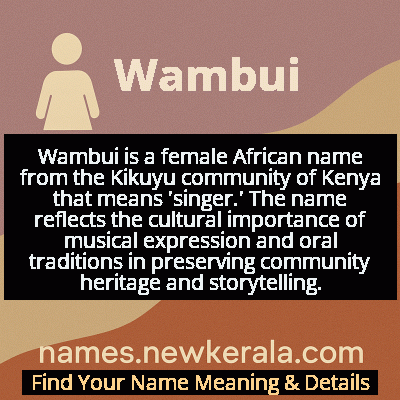Wambui Name Meaning & Details
Origin, Popularity, Numerology Analysis & Name Meaning of Wambui
Discover the origin, meaning, and cultural significance of the name WAMBUI. Delve into its historical roots and explore the lasting impact it has had on communities and traditions.
Name
Wambui
Gender
Female
Origin
African
Lucky Number
6
Meaning of the Name - Wambui
Wambui is a female African name from the Kikuyu community of Kenya that means 'singer.' The name reflects the cultural importance of musical expression and oral traditions in preserving community heritage and storytelling.
Wambui - Complete Numerology Analysis
Your Numerology Number
Based on Pythagorean Numerology System
Ruling Planet
Venus
Positive Nature
Harmonious, responsible, caring, and artistic.
Negative Traits
Overly idealistic, superficial, possessive, or jealous.
Lucky Colours
Pink, turquoise.
Lucky Days
Friday.
Lucky Stones
Diamond, turquoise.
Harmony Numbers
2, 3, 9.
Best Suited Professions
Artists, musicians, teachers, healthcare workers.
What People Like About You
Warmth, nurturing nature, artistic flair.
Famous People Named Wambui
Wambui Otieno
Political Activist & Author
Prominent Kenyan feminist, freedom fighter, and author of 'Mau Mau's Daughter' autobiography
Wambui Wairimu
Environmental Activist
Leading conservationist working on community-based forest preservation in Central Kenya
Wambui Mwangi
Academic & Political Scientist
Renowned scholar specializing in African politics and post-colonial studies at University of Toronto
Wambui Kairu
Business Leader
Successful entrepreneur and founder of multiple women-led agricultural enterprises in Kenya
Name Variations & International Equivalents
Click on blue names to explore their detailed meanings. Gray names with will be available soon.
Cultural & Historical Significance
Historically, women named Wambui were often expected to be custodians of cultural songs and musical traditions, playing vital roles in ceremonies, initiations, and community gatherings where their vocal talents helped preserve the people's heritage and collective memory. During the colonial period and Mau Mau uprising, songs became covert means of communication and resistance, adding layers of political significance to the name. Today, Wambui represents both cultural continuity and the evolving role of women in Kenyan society, bridging traditional values with contemporary aspirations.
Extended Personality Analysis
Individuals named Wambui are typically associated with expressive, communicative, and socially engaging personalities. They often possess natural charisma and the ability to connect with others through their verbal and emotional expressiveness. These individuals tend to be creative, artistic, and emotionally intelligent, with a strong inclination toward community involvement and cultural preservation. Their 'singer' identity often translates into being natural storytellers, peacemakers, and cultural ambassadors who use their communication skills to bridge gaps and foster understanding.
Wambuis typically exhibit warmth, empathy, and a nurturing disposition, making them well-suited for roles that require emotional connection and cultural sensitivity. They are often perceived as resilient and adaptable, qualities that have been historically important in navigating social changes while maintaining cultural roots. Many demonstrate strong leadership qualities combined with collaborative spirit, able to inspire others while working effectively within groups. Their artistic nature often manifests in various forms beyond singing, including writing, public speaking, or visual arts, reflecting the multifaceted nature of creative expression in modern contexts.
Modern Usage & Popularity
In contemporary times, Wambui remains a popular and respected name among the Kikuyu community and increasingly across Kenya. While maintaining its traditional roots, the name has evolved to represent modern Kenyan femininity that honors cultural heritage while embracing contemporary values. Urbanization and inter-ethnic marriages have spread the name's usage beyond strictly Kikuyu communities, though it remains most prevalent in Central Kenya. The name continues to be chosen by parents who value cultural preservation and want to instill artistic expression and community values in their daughters. Recent years have seen a resurgence in traditional African names, with Wambui benefiting from this cultural renaissance as Kenyans reclaim their linguistic and naming heritage. The name maintains moderate popularity rankings nationally and is increasingly recognized as a symbol of authentic African identity in global contexts.
Symbolic & Spiritual Meanings
Symbolically, Wambui represents much more than just a singer - it embodies the power of voice, expression, and cultural continuity. The name symbolizes the preservation of oral history and traditional wisdom through musical and narrative traditions, representing the idea that every individual has a unique 'song' or story to contribute to their community. Metaphorically, Wambui signifies harmony, both in musical terms and in social relationships, suggesting a person who can bring people together through shared expression and understanding. The name also carries connotations of resilience and adaptability, as traditional songs often served as covert means of communication and cultural preservation during challenging historical periods. Ultimately, Wambui symbolizes the enduring power of cultural expression to sustain identity across generations while adapting to contemporary realities.

